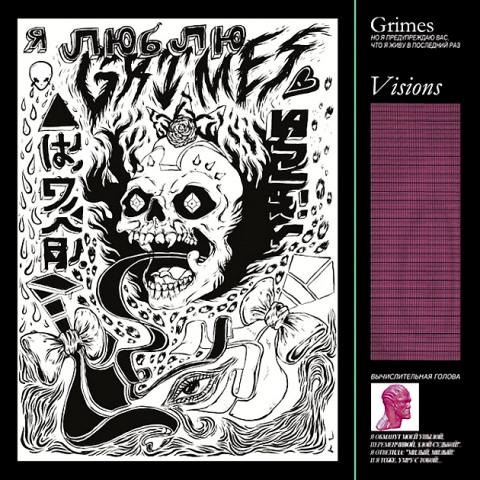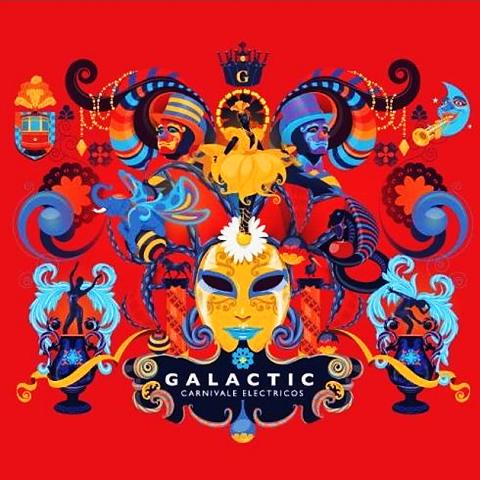Grimes
Visions
4AD

Visions, the third solo album by the Montreal musician Claire Boucher, who records as Grimes, starts out at full speed: Its opening track, Infinite Love Without Fulfillment, gallops hard, a collision of art-rock and electro-pop, all in service of Boucher’s blithe coos.
Grimes has been releasing music for only two years but has already established a signature approach. It’s insular and unnerving, a blend of the naive and the erotic. At times, though, it’s been almost irredeemably precious, largely because Boucher’s tendency toward vocal experimentation wasn’t leavened by any thoroughgoing embrace of melodic structure.
Visions irons out that kink admirably: It’s easily Boucher’s best work, and one of the most impressive albums of the year so far. Boucher is jubilant here, her multitracked vocals (which can recall Julianna Barwick) both an effective sonic strategy and also an emotional one. She has a lovely coo to her voice, especially on Be a Body. And she flaunts a range of influences, as on Symphonia IX (My Wait Is U), which seemingly owes debts to both Bollywood playback singers and Siouxsie Sioux.

Previously Boucher has been lost in abstractions; on this album she uses many of the same touchstones, but more directly. Circumambient is full of unlikely competing sounds — crackling white noise, tribal drums, airplane roars — that resolve themselves into coherent electro-soul. The bells on Vowels = Space and Time echo the freestyle music of the 1980s. And just maybe there’s a nod to Toni Basil on “Genesis.”
— JON CARAMANICA
Galactic

Carnivale Electricos
Anti-
Every New Orleans band has to reckon with Mardi Gras, which took place Tuesday. Galactic, formed in New Orleans in 1994, takes a wide-angle view on Carnivale Electricos, writing and transforming Carnival songs not only from New Orleans and Cajun country, but also from another Carnival epicenter: Brazil.
Onstage, Galactic is a first-rate funk band. In the studio it has become a perpetually recombinant group of musicians, producers and conceptualizers, hooking up with collaborators from New Orleans and far beyond. The guest list on Carnivale Electricos extends from New Orleans to Rio de Janeiro, in tracks that morph across time, space and cultures. Carnivale Electricos is brimming with ideas; it’s also one raw, rowdy party album.
Galactic doesn’t enforce any trademark sound. While New Orleans funk is laced through the album, it’s freely collaged with all sorts of other things. So Ha Di Ka, featuring Big Chief Juan Pardo and his Mardi Gras Indian tribe, Golden Comanche, isn’t just one more Indian chant backed by a band; it’s got fat-bottomed electronics, a deranged psychedelic guitar and explosive samples grapping with Galactic’s keyboard funk.
Voyage Ton Flag, alluding to an old Creole Carnival song from bayou country, crosscuts between a distorted guitar groove, an electronically stuttered Creole vocal (from Steve Riley) and bits of Clifton Chenier’s zydeco accordion. A remake of the 1960 Mardi Gras standard, Carnival Time — heartily sung by its songwriter and original performer, Al Johnson — throws together brass-band horns, Latin percussion and a determinedly funky clavinet.
Galactic is a more straightforward backup band for the hard-headed, humorous rappers Mystikal and Mannie Fresh in Move Fast, and for Cyril and Ivan Neville in Out in the Street. It meshes some wah-wah guitar with the hefty brass of the KIPP Renaissance High School Marching Band in Karate, and leans toward hard-bop in the instrumental Attack.
The Brazil Carnival connection is forged in O Coco da Galinha, a collaboration by Galactic and Moyseis Marques, a samba singer from Rio de Janeiro, that meshes New Orleans and Rio rhythms. A version of Carlinhos Brown’s Magalenha features a New Orleans Brazilian band, Casa Samba; Galactic zaps the song’s Bahian beat with synthesizer swoops. And the 57-second Guero Bounce places a bluesy harmonica over Brazilian percussion and New Orleans’ hip-hop-tinged bounce beat.
In other words, variety reigns. Galactic doesn’t set out to document Mardi Gras and Carnival traditions, but to extrapolate from them every which way, and the Carnival spirit of wide-open possibility comes through.
— JON PARELES
Tyga
Careless World
Young Money/Cash Money/Universal Republic
The most disposable hip-hop hit in recent months has been Tyga’s Rack City, a slinky, sleazy snake of a strip-club anthem, all vibrating bass tones and filthy come-ons. It’s a grower — empty on first listen, more and more primal over time. The beat, though, is the star; Tyga is merely percussive drizzle atop it.
This Compton, California, rapper has been on the B team of Lil Wayne’s Young Money crew for some time, displaying the occasional flash of charm, as on the hit single BedRock. Last year he was nominated for a Grammy for his collaboration with Chris Brown and Kevin McCall, Deuces.
Careless World is Tyga’s major-label debut, and it sounds like it. Even though he remains a cipher, his surroundings are lush. A collaboration with Nicki Minaj has a gyrating beat built on a sea of digitized giggles, and smooth gospelesque coos drive Do It All. Those songs, and several others on this album, are produced by Jess Jackson, who proves a strong match for Tyga, supplementing his hollowness with density and feeling.
Tyga is a labored rapper at best, though he’s capable of a variety of cadences — he’s bouncy on Potty Mouth and pleasingly nasal on Faded. But his method can’t redeem his sometimes clunky word jumbles: “You fold up under pressure/ I’m good, straighter than stretchers” on I’m Gone; “The world so cold you gonna need a Moncler” on This Is Like.
— JON CARAMANICA

In the March 9 edition of the Taipei Times a piece by Ninon Godefroy ran with the headine “The quiet, gentle rhythm of Taiwan.” It started with the line “Taiwan is a small, humble place. There is no Eiffel Tower, no pyramids — no singular attraction that draws the world’s attention.” I laughed out loud at that. This was out of no disrespect for the author or the piece, which made some interesting analogies and good points about how both Din Tai Fung’s and Taiwan Semiconductor Manufacturing Co’s (TSMC, 台積電) meticulous attention to detail and quality are not quite up to

April 21 to April 27 Hsieh Er’s (謝娥) political fortunes were rising fast after she got out of jail and joined the Chinese Nationalist Party (KMT) in December 1945. Not only did she hold key positions in various committees, she was elected the only woman on the Taipei City Council and headed to Nanjing in 1946 as the sole Taiwanese female representative to the National Constituent Assembly. With the support of first lady Soong May-ling (宋美齡), she started the Taipei Women’s Association and Taiwan Provincial Women’s Association, where she

It is one of the more remarkable facts of Taiwan history that it was never occupied or claimed by any of the numerous kingdoms of southern China — Han or otherwise — that lay just across the water from it. None of their brilliant ministers ever discovered that Taiwan was a “core interest” of the state whose annexation was “inevitable.” As Paul Kua notes in an excellent monograph laying out how the Portuguese gave Taiwan the name “Formosa,” the first Europeans to express an interest in occupying Taiwan were the Spanish. Tonio Andrade in his seminal work, How Taiwan Became Chinese,

Mongolian influencer Anudari Daarya looks effortlessly glamorous and carefree in her social media posts — but the classically trained pianist’s road to acceptance as a transgender artist has been anything but easy. She is one of a growing number of Mongolian LGBTQ youth challenging stereotypes and fighting for acceptance through media representation in the socially conservative country. LGBTQ Mongolians often hide their identities from their employers and colleagues for fear of discrimination, with a survey by the non-profit LGBT Centre Mongolia showing that only 20 percent of people felt comfortable coming out at work. Daarya, 25, said she has faced discrimination since she